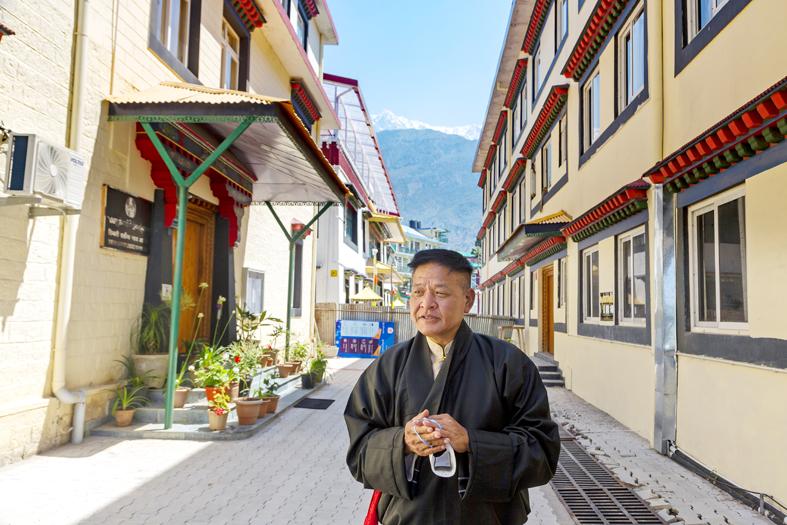The new president of the Tibetan exile government yesterday said that he was willing to reach out to the Chinese government to resolve their conflict, although the sides have not had dialogue in more than a decade.
Penpa Tsering, former speaker of the Tibetan exile parliament, was sworn in as president of the Central Tibetan Administration at a ceremony in Dharmsala, the northern Indian town where Buddhist spiritual leader the Dalai Lama has been living since he fled Tibet after a failed uprising against Chinese rule in 1959.
The Dalai Lama participated virtually in the ceremony from his residence and spoke briefly.

Photo: AP
China denies curbing religion in Tibet and says the Himalayan region governed by the Chinese Communist Party since 1951 has been Chinese territory since the mid-13th century.
Many Tibetans say that they were effectively independent for most of their history and that the Chinese government wants to exploit the resource-rich region, while crushing its cultural identity.
China does not recognize the Central Tibetan Administration and has not held any dialogue with representatives of the Dalai Lama since 2010.
India considers Tibet as part of China, although it hosts the Tibetan exiles.
Penpa Tsering said a Chinese “white paper,” or policy document, issued on Friday last week had nothing new on Tibet.
“All I can say is we are open to send people to verify the facts that they have claimed in the white paper,” he told reporters. “At the same time, we have always been very consistent in our position that we are willing to reach out to the Chinese government to resolve the Sino-Tibetan conflict.”
Beijing accuses the Dalai Lama of seeking to separate Tibet from China, which he denies. Penpa Tsering supports the Dalai Lama’s position.
Some Tibetan groups advocate independence for Tibet, as little progress has been made in talks with China.
The election, which was held in two rounds in January and April, was the third direct election of the Tibetan exile leadership since the Dalai Lama withdrew from any political role in the running of the exile government in 2011.
Nearly 64,000 Tibetans living in exile in India, Nepal, North America, Europe, Australia and elsewhere voted.
Penpa Tsering, 53, was elected to the exile parliament in 1996 and became speaker in 2008. He succeeded Lobsang Sangay, who completed his second five-year term.

‘TERRORIST ATTACK’: The convoy of Brigadier General Hamdi Shukri resulted in the ‘martyrdom of five of our armed forces,’ the Presidential Leadership Council said A blast targeting the convoy of a Saudi Arabian-backed armed group killed five in Yemen’s southern city of Aden and injured the commander of the government-allied unit, officials said on Wednesday. “The treacherous terrorist attack targeting the convoy of Brigadier General Hamdi Shukri, commander of the Second Giants Brigade, resulted in the martyrdom of five of our armed forces heroes and the injury of three others,” Yemen’s Saudi Arabia-backed Presidential Leadership Council said in a statement published by Yemeni news agency Saba. A security source told reporters that a car bomb on the side of the road in the Ja’awla area in

PRECARIOUS RELATIONS: Commentators in Saudi Arabia accuse the UAE of growing too bold, backing forces at odds with Saudi interests in various conflicts A Saudi Arabian media campaign targeting the United Arab Emirates (UAE) has deepened the Gulf’s worst row in years, stoking fears of a damaging fall-out in the financial heart of the Middle East. Fiery accusations of rights abuses and betrayal have circulated for weeks in state-run and social media after a brief conflict in Yemen, where Saudi airstrikes quelled an offensive by UAE-backed separatists. The United Arab Emirates is “investing in chaos and supporting secessionists” from Libya to Yemen and the Horn of Africa, Saudi Arabia’s al-Ekhbariya TV charged in a report this week. Such invective has been unheard of

US President Donald Trump on Saturday warned Canada that if it concludes a trade deal with China, he would impose a 100 percent tariff on all goods coming over the border. Relations between the US and its northern neighbor have been rocky since Trump returned to the White House a year ago, with spats over trade and Canadian Prime Minister Mark Carney decrying a “rupture” in the US-led global order. During a visit to Beijing earlier this month, Carney hailed a “new strategic partnership” with China that resulted in a “preliminary, but landmark trade agreement” to reduce tariffs — but

SCAM CLAMPDOWN: About 130 South Korean scam suspects have been sent home since October last year, and 60 more are still waiting for repatriation Dozens of South Koreans allegedly involved in online scams in Cambodia were yesterday returned to South Korea to face investigations in what was the largest group repatriation of Korean criminal suspects from abroad. The 73 South Korean suspects allegedly scammed fellow Koreans out of 48.6 billion won (US$33 million), South Korea said. Upon arrival in South Korea’s Incheon International Airport aboard a chartered plane, the suspects — 65 men and eight women — were sent to police stations. Local TV footage showed the suspects, in handcuffs and wearing masks, being escorted by police officers and boarding buses. They were among about 260 South